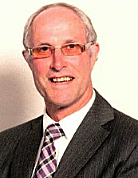 Reg Bennett
Reg Bennett
I have known Reg Bennett for many years but it was not until recently that his wide-ranging involvement in the Cornish music scene became apparent to me. We were both members of the Cornwall Youth Brass Band during the early 1960s but our paths diverged and Reg set off on a course which led him down so many musical avenues. I hesitate to use the word unique but it seems so appropriate to describe Reg’s involvement in such an extraordinary range of musical genres: from brass band to the orchestra pit, from dance band into the big band sound, from jazz into session music and finally, via a number of other forms, to soul. His love of music never diminished as he seamlessly moved from one to the other. (Tony Mansell – Bardh Kernow)
Reg was born on the 26th November 1946, at Trevorrian Farm, Kehelland. In his own inimitable way he said, “I entered the world feet first and have been putting my foot in it ever since!” He is a proper Camborne man: proud of his Cornishness, of his accent, and that he was born in the Parish of Camborne.
His parents, Archie and Enid Bennett, were well-known Camborne farmers and long before Reg left school he was helping with the farm work. He said, “I attended Kehelland Junior & Infants and Treswithian Secondary School. Then on to Cornwall Technical College to study agriculture. The only career I wanted was to be a farmer.” It was therefore no surprise when he decided to join his father on the land, an involvement which lasted from 1962 to 1989.
Reg married Patsy Wallace on the 7th November 1973. “At first, we lived in Higher Kehelland Farm Cottage but in 1977 we moved into the farmhouse, when my parents left there to live in Kieve Mill Farm Bungalow. We had two children: Warren, born on the 24th May 1978, and Sam, born on the 12th October 1979. Warren studied cornet under Albert Chappell reaching grade 8. He obtained a music scholarship to Truro School where he had lessons with Derek Greenwood. He played in several school concerts with his classmate James Knight, joined Cornwall Youth Brass Band and was a member of Redruth Town Band under Francis Ralph. From there he moved to Camborne Town Band before leaving to attend Bournemouth College studying Design and Technology. Sam studied guitar under Paul Hodder at Falmouth and reached grade 6. He was a member of the Truro School Jazz orchestra and now has his own band playing covers and heavy rock. Both of my sons hate Jazz with a passion, and generally dislike any music that I like!”
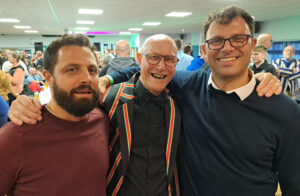 Sam, Reg and Warren in October 2022
Sam, Reg and Warren in October 2022
The Brass Band Years
Neither Reg’s mother nor his father was involved in music in any way but they supported him when he showed signs of wanting to play in a band. He said, “Even as a toddler I loved the sound of a brass band, and I could often be seen marching around our garden using a stick to imitate a trombone”. It was therefore not surprising that he decided to take lessons to play a brass instrument.
Reg started learning to play the cornet in 1958, under Freddie Roberts. He said, “He was a tough task master and there were many instances when I was reduced to tears. I remember one occasion when I awoke from a nightmare at 4.00 o’clock in the morning. It involved a music lesson when Mr Roberts was being particularly hard on me. My mother was livid and decided to ring him there and then. The conversation went something like this:
“Is that Mr Roberts?”
“Yes.”
“Well, Reg has just had a nightmare about you and now I can’t sleep so I thought, why should you?”
Reg joined the popular Camborne Town Band – first in the Youth Band under Telfer Rule, and then, in 1960, in the senior band conducted by the diminutive but formidable Freddie Roberts.
Freddie Roberts, Mr Roberts to all the players, was a stickler. He was strict to the point of being brutal but he was a great musician albeit rigid in his interpretation of the music. His contest record at Camborne, and later with other bands, is legend but his methods were not appreciated by everyone. Indeed, at one annual general meeting, the father of one of the players stood up and said that as a musician he was exceptional … his description of his character was a bit less complimentary.
Considering Reg’s early love of the trombone, that was the instrument he wanted to play but Freddie Roberts had other ideas. He introduced him to the cornet, an instrument which he was to play throughout his brass band career. It left Reg with the feeling that Freddie was more at home teaching the cornet than the trombone.
Reg recalled an occasion when Camborne Town Band was playing at Frogpool tea treat in the very early 1960s: “We had a long march which took us passed the home of Mr and Mrs Thomas of E Thomas Construction. Mrs Thomas must have thought that we looked thirsty as she came out with a basket of Britvic drinks. I think these must have been a new and unfamiliar drink and Freddie Roberts stepped forward and told us all to get back. He then examined the label until he had convinced himself that they contained no alcohol and only then were we allowed to drink them.”
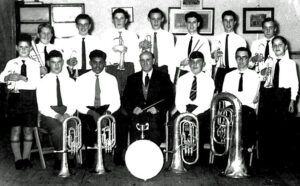 Camborne Youth Band under Telfer Rule – winners of the Cornwall Instrumental Group at a talent contest at Holman’s Canteen in 1961. Reg is second right in the back row.
Camborne Youth Band under Telfer Rule – winners of the Cornwall Instrumental Group at a talent contest at Holman’s Canteen in 1961. Reg is second right in the back row.
Reg recalled his first participation in the National Brass Band Championship of Great Britain. “It was at the Royal Albert Hall in 1962 and I remember how daunting it was to walk onto the stage. Mr Roberts had had considerable experience of playing and conducting at this championship and he told us to squeeze together so that our chairs were touching and not to look out at the audience. I couldn’t help taking a glance but the lighting was such that all I could see was a huge, black space. Despite sitting close together, I felt really alone, and imagined that the adjudicator would hear every individual note. Before we played, I had walked around the corridors under the stage and spotted Black Dyke’s dressing room, that certainly brought home to me the enormity of the occasion. Jack Pascoe was playing flugel and had such a busy part that he hardly had time to catch breath. I had to cover him for two bars to help him out. I was playing repiano cornet at the time and to achieve a softer tone, I hung a blue beret over the bell.”
 Reg with some of his trophies from his brass band days.
Reg with some of his trophies from his brass band days.
The photographs above were taken following the St Dennis Solo Contest. Reg said, “I played Brown Bird Singing by Haydn Wood and was awarded first place in the under fifteen-years-old section. It was the only occasion when I headed Camborne Town Band’s principal cornet player Monty Ray but he got his revenge in the under-eighteen-years-old section when he was placed first and I was second.”
The extensive records of the Cornwall Youth Brass Band shows that Reg was a member from 1960 to 1963 and that during that time he played under brass band greats: Dr Denis Wright, T J Powell and Eric Ball. There was also an impressive list of local tutors including Cecil Brewer, Edgar Floyd, Frank Moore, and Eddie Williams. Men who generously devoted their time to the Cornish brass band movement and to the youth of Cornwall.
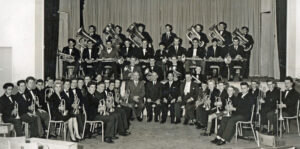 CYBB 1961 – guest conductor T J Powell (second left) with Frank Moore, Eddie Williams and Cecil Brewer (Reg is in the second row of the top cornets, next to Monica Orchard)
CYBB 1961 – guest conductor T J Powell (second left) with Frank Moore, Eddie Williams and Cecil Brewer (Reg is in the second row of the top cornets, next to Monica Orchard)
Reg also qualified to join the National Youth Brass Band of Great Britain (NYBBGB): “The band had its 1962 annual course in St AustelI and I decided to audition. Mr Roberts had been against the idea and refused to sign my application form until my mother bullied him into doing so. Looking back, I think that he was right. He didn’t think that I was ready and probably felt that my failure to be selected would reflect on him. However, I passed the audition, and my first two years were spent in the third and then second cornet ranks but in the third year I made it to the front row. It was a great experience and I enjoyed it immensely. A number of players from Camborne joined at the same time and these, together with members of other Cornish bands, swelled the Celtic contingent.”
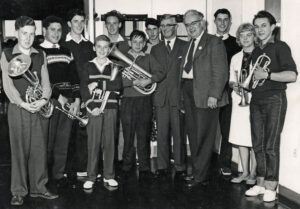 August 1962, the new NYBBGB players: Malcolm Yelland (St Dennis), Roy Wearne (Camborne), Desmond Burley (Camborne), Andre Helleur (St Austell), Paul Hiley, Graham Dale (Bodmin), Phil Harris (Bodmin), Reg Trudgian, Leonard Davies (Secretary of the NYBB of GB), Reg Bennett (Camborne), Monica Orchard (Camborne), Gerald Bowden (St Austell)
August 1962, the new NYBBGB players: Malcolm Yelland (St Dennis), Roy Wearne (Camborne), Desmond Burley (Camborne), Andre Helleur (St Austell), Paul Hiley, Graham Dale (Bodmin), Phil Harris (Bodmin), Reg Trudgian, Leonard Davies (Secretary of the NYBB of GB), Reg Bennett (Camborne), Monica Orchard (Camborne), Gerald Bowden (St Austell)
“Derek Garside was one of our tutors, a really nice guy and a great player. He wandered over for a chat and asked me which band I played with. I was proud to say that it was Camborne Town which led him to ask who had taught me to play. I replied that it was Mr Roberts at which point he put his hand on my shoulder and said, ‘You have my sympathy’. Derek had been coached by him at Brighouse and Rastrick and had clearly been subjected to some of the Roberts’ treatment.”
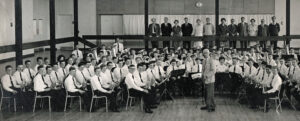 The National Youth Brass Band of Great Britain at the St Austell course in 1962 under Dr Denis Wright (Reg is third left)
The National Youth Brass Band of Great Britain at the St Austell course in 1962 under Dr Denis Wright (Reg is third left)
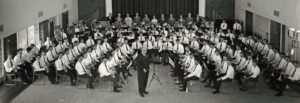 The National Youth Brass Band of Great Britain in 1963 here being conducted by Leonard Davies (Reg is playing repiano)
The National Youth Brass Band of Great Britain in 1963 here being conducted by Leonard Davies (Reg is playing repiano)
Reg’s third and final course was in 1964 which was held at Wesley Hall in Gloucester.
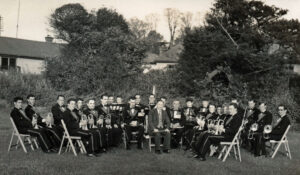 Camborne Town Band circa 1965 with Reg on repiano (second from left)
Camborne Town Band circa 1965 with Reg on repiano (second from left)
Reg recalled a photograph his sister took of him as he marched through Camborne. Fred Roberts caught sight of it and immediately turned on him and said, “There you are, just what I’ve been telling you, you don’t hold your instrument high enough”.
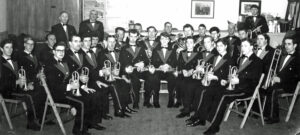 Camborne Town Band under Freddie Roberts in 1965 (Reg is third left in the front row cornets)
Camborne Town Band under Freddie Roberts in 1965 (Reg is third left in the front row cornets)
The continual round of contests and engagements with Camborne Town Band was taking its toll on this young man who was becoming more and more involved in running the family farms. Idris Stone, the second man down on the solo cornet rank, was to reduce his commitment and Reg was told that he was to take his place, next to principal cornet player, Monty Ray. Reg said, “I thought it fair to tell Mr Roberts that I was planning to leave and could not accept the promotion. As ever, his was the only opinion that mattered, and it was clear that he was not going to accept it lightly. I have to say though, he took it better than I expected.” Reg added, “Apart from my farm work I was finding the formal structure of the brass band a bit restrictive and since 1963 I had also been playing trumpet about once a week with the Eric James Dance Band. I enjoyed this involvement as it provided me with considerably more expressive freedom than was possible in the brass band. An interesting feature of the time was the dance card, given to girls as they entered. This listed the order of the dances and in the next column they could write the names of the boys with whom they were going to dance.”
As far as Camborne Town Band was concerned, Reg had made his decision to leave and a little later, he did so. “It was just after the 1965 National Brass Band Championships at the Royal Albert Hall, when we were placed sixth playing Triumphant Rhapsody by Gilbert Vinter, an impressive result considering we were up against the best in the country”. As Reg said, it really was a great result and a good note to finish on (pun intended). His brass band career had been comparatively short, certainly when compared to some of his contemporaries, but he had been a member of a Championship section band, competed in the National Brass Band Championships of Great Britain, been a member of the Cornwall Youth Brass Band and the National Youth Brass Band of Great Britain.
In our conversations however, it was clear that brass bands, and Camborne Town Band in particular, remained close to his heart. It was after all, where his musical career had its first awakening. Despite his playing career leading him in a different direction, Reg did not sever his connections with the brass band movement and from 1993 to 1999, he was Chairman of the Cornwall Youth Brass Band and from 2003 to 2005 of Camborne Town Band.
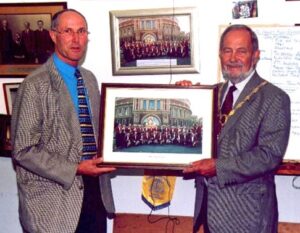 Reg Bennett, Chairman of Camborne Town Band, presenting Camborne Mayor, Cyril Waterhouse, with a photograph of the band.
Reg Bennett, Chairman of Camborne Town Band, presenting Camborne Mayor, Cyril Waterhouse, with a photograph of the band.
In November 2006, Reg was delighted to pick up the cornet again as he joined with 67 other former members of Camborne Town Band to take part in a re-union concert. Alan Toy and John Phillips used all their considerable charm and persuasive skills to assemble a band of past players for the concert at Pool Business and Enterprise College. Their reward came in the form of a packed hall. At that concert, Reg was made a life member of the Camborne Town Music Society, a singular honour. Former musical director, Derek Greenwood, conducted and past secretary, Robert Seymour, compèred as the players re-lived their banding days to take part in a sparkling concert. With instruments borrowed from Penzance and Redruth Bands and with only three rehearsals, they took their place on the concert stage once again and played their hearts out to entertain the audience, raising over £1,100 for the band room appeal. Former principal cornet Robert Tanner, Kevin Goninan, Andrew Kemp, Paul Bilkey, Richard Knight and James Knight had travelled from outside Cornwall to take part and when the blowing had finished, former flugel player, Jack Pascoe, told them, “You may not have played for a few years, but you certainly haven’t forgotten how. I wouldn’t have missed it for anything!” The audience was amazed by the tremendous sound as the veterans played Old Comrades, Zampa, You Raise Me Up, The Cossack, Great Soul, An American Trilogy, Washington Grays, Die Felsenmuhle, Nimrod, Music, Dear Lord and Father of Mankind and Slavonic Rhapsody No. 2. The evening concluded in true Cornish fashion with a few drinks and a pasty.
Those taking part:
Cornets: Leonard Adams, Sarah Bateman, Reg Bennett, Paul Bilkey, Desmond Burley, Monica Dean, Marcus Dunstan, Alan Faraway, Kevin Goninan, Darren Hendy, Ian Hooper, Sharon Hooper, Norman Johns, Clyde Keverne, James Knight, Monty Ray, David Read, Jeremy Squibb, Chris Parkin, Alan Pope, Karen Pritchard, Robert Tanner, Stephen Trelease, Barrie Trevena and David Whear.
Tenor Horns: Graham Barker, Elaine Bray, Wayne Brown, Andrew James, Richard Knight, David Pascoe and Neil Rutter.
Baritones: Audine Button, Terry Sleeman, Rachel Squibb and Edwin Willcocks.
Trombones: Lester Ashton, Alan Caddy, Adrian Dower, Kevin Dower, David Nicholas, David (Diddy) Nicholas, John Phillips and Andrew Teague.
Euphoniums: Courtney Berryman, Mark Bray, John Hitchens, Andrew Kemp and Alan Toy.
Eb Basses: David Coad, Tim Joslin, Russell Kellow, Michael Prichard, Terry Tonkin, Michael Weeks and Ashley White.
Bb Basses: George Ansell, Phil Blake, Jonathan Bond, Jason Smith, Eric Thomas and Lee Trewhella.
Percussionists: Nigel Chadd, Mike Hocking, Andrew Tellam and Stephen Weeks.
In the Orchestra Pit
Two or three years after he had left Camborne Town Band, Reg was invited to join a few former colleagues in the orchestra pit for the annual shows performed by various operatic societies around Cornwall. He recalled, “My involvement began when regular player John Austin was unable to play for one of the shows. It was Annie Get Your Gun, and he suggested that I may be able to deputise for him. I was able to do so and that began an involvement which lasted from 1968 until the 1990s and took place at many venues across Cornwall. These were enjoyable events and completely different to anything else in which I had been involved. It was also good to be playing with Camborne Town Band players again like Alan Toy on tenor horn and trombonists Eddie Ashton, Doug Piper and David Nicholas.”
The Dance Band Era
Perhaps it’s difficult for brass bandsmen and women to imagine a player tiring of that medium but that was the word Reg used. However, his love of brass bands didn’t diminish, it was just that he was seeking a genre based less on rigid interpretation and more on one where artistic license was possible. For Reg, that freedom of expression was through his involvement with dance bands. We have already mentioned the Eric James Dance Band and this was followed by an involvement with another, the Blue Rhythmics Dance Band. Reg had now left the cornet far behind and was making his name as a trumpet player.
In 1969, the film Straw Dogs was being filmed in West Cornwall. Sam Pekinpah was the director and it starred Dustin Hoffman and Susan George. Reg said, “Viv Rodd was booked to play at the end-of-filming party at the Tregenna Castle at St Ives and I had no hesitation in agreeing to play trumpet. It was some party with the drinks flowing like there was no tomorrow. Sam Pekinpah placed £400 behind the bar and went to bed but had to be woken to top it up. I remember actress Sally Thomsett in a poncho entering into the fun and leaving a far different memory from when she appeared in The Railway Children. We were booked to entertain but we did get our chance to join in the fun.”
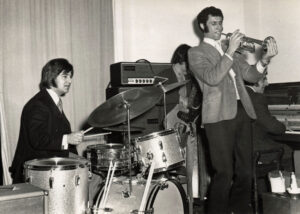 1969: Terry Rodd on drums, Eric Stephens on bass, Reg on trumpet and Viv Rodd on piano (out of shot).
1969: Terry Rodd on drums, Eric Stephens on bass, Reg on trumpet and Viv Rodd on piano (out of shot).
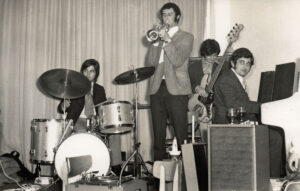 1969: Terry Rodd on drums, Eric Stephens on bass, Reg on trumpet and Viv Rodd on piano.
1969: Terry Rodd on drums, Eric Stephens on bass, Reg on trumpet and Viv Rodd on piano.
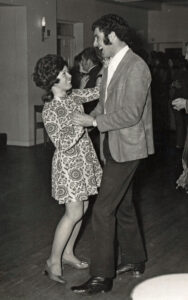 1969: Reg, dancing with a member of the Straw Dogs production team – and why not!
1969: Reg, dancing with a member of the Straw Dogs production team – and why not!
The Big Band Years
Just around the corner was another musical challenge and Reg took to it like the proverbial duck in water.
The Big Band sound had been dominant during the 1930s and the 1940s with the name of Glenn Miller synonymous with it. Then, in the 1950s, Rock and Roll arrived. A new type of band was centre stage. Perhaps though, the Big Band sound never truly went away. The devotees were still in the wings waiting for a comeback and in the late 1960s it arrived. The Glenn Miller sound would soon be swinging high again.
The John Austin and his five-piece dance band had been around in Cornwall for some time, it was well-known and very popular. But he was a man with a mission, and in 1970 he began to lead a resurgence of the Big Band sound. John approached several players and invited them to join with him to form a band. Some had retired from the professional scene up-country and all but three were currently playing in dance bands. Rehearsals began and it quickly became clear that the players enjoyed the involvement, but it had yet to be proved if it would be a hit with the public.
The band – The John Austin Big Band (Sound of Glen Miller) – made its debut at The Arts Theatre in Falmouth in September 1969 and the question was answered…it was a huge success. The players were delighted: they had received no payment for this initial event and all profits were directed to charitable causes. Another concert followed in Newquay and again, it was a sell-out. A two-night event was held in Falmouth in early 1971 when the attendance was huge: a testament to its popularity. In April 1971, a fourth event was held at Newquay’s Cosy Nook Theatre and 500 tickets sold within days. It was clear that the audience was hungry for the sound. Writing about it, the West Briton of the 15th April 1971 led with the headline:
Miller-mania has gripped Cornwall
The boys in the band are continually astounded at the public reaction. Their fame has spread beyond the Tamar, even over the sea. John Austin had difficulty in forming a band for the first concert but now they are queueing to get in. Music of Glenn Miller, Tommy Dorsey, Duke Ellington, Woody Herman and Britain’s own architect of the big band, Ted Heath.
How they line up: (spelling as appeared in the newspaper)
Saxophones/clarinets: Peter Harrison, Peter Harvey, Clive Makinson, Ray Roberts (plays with the Ray Allan Band), Johnny Woollams (Newquay)
Trumpets: Reggie Bennetts (who farms at Kehelland), Ronnie Downs (Bodmin), Cliff Fitzpatrick (Bodmin), Paul Timmins (Breage)
Trombones: Eddie Ashton (Helston Town Band Musical Director) Doug Piper, Dennis Rundle
Vibes: Mick Jackman (an Australian from Newquay)
Piano: Phil Prince
Drums: Alan Blackett
Bass: Dave Freeman
Vocalist: Mike Messenger
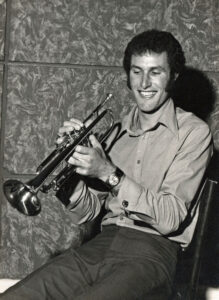 1973: Reg taking part with the John Austin Big Band at the Regal, Redruth. He said, “I think that I was photographed as I was the only one from Camborne!”
1973: Reg taking part with the John Austin Big Band at the Regal, Redruth. He said, “I think that I was photographed as I was the only one from Camborne!”
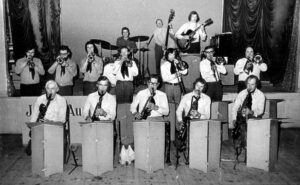
The line-up of the John Austin Big Band (Sound of Glen Miller) at the Princess Pavilion, Falmouth in 1974.
Trumpets: Cliff Fitzpatrick, Paul Timmins, Reg Bennett (Lead), Ronnie Downes
Trombones: Denis Rundle, Eddie Ashton, Doug Piper, Ray Dawe (Bass)
Saxophones: Freddie Hubbard (Baritone), Clive Makinson (Alto), Peter Harrison (Alto), John Woolhams (Tenor), Basil Towell (Tenor)
Rhythm: Phil King (Keyboards), John Knight (Guitar), Trevor Lapham (Bass), Alan Blackett (Drums)
Vocals: Mike Messenger
We hope that the inclusion of these extracts from some of the programmes from the John Austin concerts does not cause offence
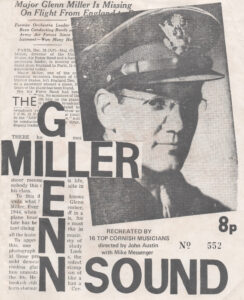
There has always been the faithful adherence, but the last couple of years or so has seen a revival of interest on the scale that not even the keenest Glenn Miller fan would have prophesised.
Nowhere has the phenomenon being so much in evidence as in Cornwall, for long regarded as being out of the mainstream of developments because of its geographical position.
The architect then as now, was John Austin, who plays a crisp trumpet with his own five-piece band, but for some time he had hoped to recreate the big band sound, but with the economics of the dance band being what they are, and with the groups having to be small to survive, it seemed his dream would remain just that. However, he scouted the idea of arranging a concert in aid of charity, with the musicians drawn from several bands giving their services. Problems abounded. To fix a night for a concert when all members of the band would be free of other engagements was one headache, let alone trying to get them together for a rehearsal. But more importantly, the question was: would the public like it or would it be a disastrous flop?
John Austin could only call on 13 musicians for that first concert at Falmouth but he need not have worried. Acclaim was immediate. Other concerts followed – and were a sell out within days of the tickets going on sale. Crowds hummed and whistled their way home to the lingering echoes of those swinging sounds. The musicians themselves relished playing in a big line up, and they too, were soon queuing up for a chance to become involved. So much so that today John Austin has an abundant pool of talent to draw on.
As the band became more proficient, so the scope of the concerts broadened. The programme began to include numbers made famous by other big bands: Tommy Dorsey, Duke Ellington, Count Basie, Ted Heath, and the crowds loved these as well, but the old Miller favourites remained the pivot of the shows; evergreens such as Chattanooga Choo Choo, American patrol, and Serenade in Blue always drew the loudest applause.
The enthusiasm of those concerned, and that of the general public, shows no sign of abating. So much for those critics who said it couldn’t last. (Johnny Maxwell)
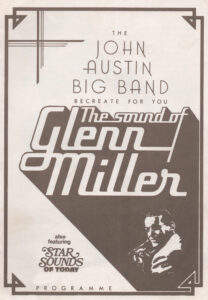
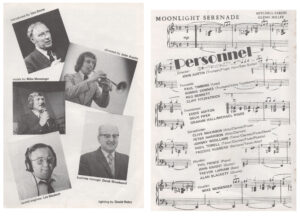
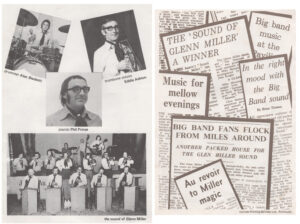
Our Cornish orchestra not only pays its tribute to the past by featuring most of the big band scores in our ever-increasing library, but also salutes the present by a careful selection of contemporary numbers which we feel the band leaders themselves would have chosen. It is of constant amazement to us how far the band’s reputation has spread – well beyond the Cornish boundaries – and comes as no surprise when a visitor says, “I heard all about you back home”.
We are fortunate that Cornwall happens to currently possess such a galaxy of talented musicians who played and broadcast with many of the big-name bands in their heyday.

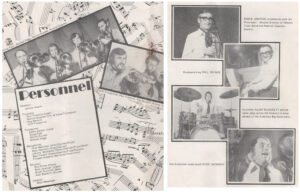
Since musical director John Austin first formed the Glenn Miller sound and filled the Polytechnic Hall, Falmouth, the orchestra has made appearances all over the Cornish peninsula, truly establishing in times of change, the ever-refreshing thrill at the sight and sound of the disciplined majesty of big band music. On the longer trips, the band travels by coach and once all the personnel are aboard, everyone begins to sort his music into programme order.
The John Austin Big Band was a huge success, so much so that it performed at the Princess Pavilion, Falmouth, every Monday night for thirteen summer seasons.
The Jazz Years
Here, a distinction must be made between traditional and modern jazz. The most obvious difference is the sound. The traditional is softer, soothing and generally melodious, whereas modern jazz can be faster, and to some, harsher than its traditional counterpart. Reg has a strong preference for the traditional version although he has been involved in both. “I define modern jazz as a spontaneous music ensemble. My involvement was through the group Jazz Roots led by Goudie Charles, a bass player of considerable talent but I didn’t really enjoy this free form of jazz. I played with the Atlantic All Stars, the New Jubilee Jazz Band and the Great Western Jazz Company and they were great days.”
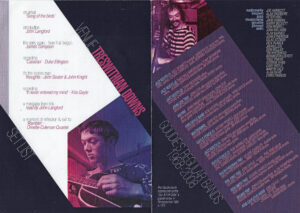 Jazz Roots
Jazz Roots
Reg was proud to show me his huge collection of music that he had played so much that he could play them blindfold. Perhaps, even more than the big band music, jazz provided him with the complete freedom of expression he was seeking. As he explained, “Although the sheet music conveys what is required, a player can introduce his or her style to make the performance unique. It was free form and considerably different to the world of brass band where I had had my musical apprenticeship.”
The Session Musician Years
Reg’s reputation as a multi-faceted musician, one who could turn his hand to any genre, quickly spread and the farm work often got in the way of his passion and led to a few missed opportunities. There were many phone calls including an event for an important dignitary in the Middle East. However, that was cancelled when a rival faction assassinated the man’s son. Many bookings did go ahead however, and these led to some interesting and enjoyable appearances.
Reg said, “Inevitably there is considerable overlap between the genres but I think that it was in 1976 or 1977 that I regularly became involved with the Viv Rodd Combo in what is described as Session Music. Both Viv and I had played in Camborne Town Band and since then we had done a few gigs together. Our careers had moved in different directions but occasionally crossed and, importantly, our respect for each other remained. The Viv Rodd Combo regularly backed visiting professional entertainers and a trumpet player was often needed to be included in his line-up. He invited me to join him and for the next six years or so I made frequent appearances with his combo at the Cornwall Coliseum at Carlyon Bay and the Talk of the West, between St Agnes and Perranporth.”
Reg described these gigs as memorable, not least because they involved meeting and accompanying many famous names. “We played at the Cornwall Coliseum for Max Bygraves and Gene Pitney, lovely people, especially Gene who always had time for a chat about the farm. At the Talk of the West there was Peters and Lee, the Supremes, Marty Kane, and others. Marty Kane was a great comedian, and a warm and generous person who always provided us with a bottle of champers after the show. On one occasion she hauled me to the front of the stage and introduced me to the audience. She asked me how tall I was and I replied six-feet, one-inch. She turned to the audience and said, ‘Here he is girls, he’s six feet tall with a one-inch fuse’. I also remember Cilla Black but for an entirely different reason. She came on stage during rehearsal and asked who was playing the introduction for one of her pieces. On being told it was me, she came over and said, ‘Well, don’t f*** it up!’ First impressions are important and this one was not good. I felt like playing it a semi-tone higher just to wind her up.”
On one occasion Reg was cutting corn in what he referred to as Round Field. It was about 8 o’clock in the evening when Patsy rushed into the field, arms waving and shouting that the Batchelors were playing at the Talk of the West and needed a trumpet player. Reg said, “I had to be there, ready to play at 10 o’clock, a hell of a rush but I couldn’t turn it down. A quick wash and change and I was on my way. Talk about the deep end – there was just time to talk through what was required before we were on stage. It went well and when we had finished, one of the Batchelors hauled me to the front of the stage and told the audience that I had played without rehearsal and that just a couple of hours before I had been driving a combine harvester.”
BBC Radio Cornwall Launch
Radio Cornwall is reputed to have begun broadcasting on the 17th January 1983, strangely later than the memories of some of us. However, whenever it was, the event was celebrated by a concert at the Princess Pavilion in Falmouth when a specially assembled orchestra entertained. Reg recalled, “Many of us had played together in the John Austin Big Band so we gelled pretty quickly. It was a great night and everyone was delighted with the outcome.”
The Cornish All Stars
“Back in my school days, a lot of budding musicians were encouraged to join in musical activities but for some reason this did not include those who played instruments only to be found in the brass band. I played the cornet and was very aware that music teachers at that time didn’t seem to consider it seriously. Never once was I invited to take part in any school concerts and speaking to others, I wonder now if this was due to a bit of musical snobbery: of the brass band being seen as the cloth cap brigade.”
“Many years later, in 2000, long-time friend Paul Carter and I decided to form the Cornish All Stars. This involved some sax, trumpet, trombone, keyboard, guitar, bass and a number of percussion players, most of whom had played together since school. We rehearsed monthly and at the end of the year put on a concert at Camborne Rugby Club when a lot of money was raised for charity.”
The Soul Band Years
With everything else going on in his life, Reg decided to become involved in yet another band – Zinzan. Bob Peters, head of music at Truro College, approached Reg with his plan to form a Soul Band which he wanted to name after his favourite rugby player, the famous New Zealand All Blacks’ number 8, Zinzan Brooke. The intention was to include twelve musicians: four sax, trumpet, trombone, four percussionists, organ, bass and guitar with Bob and Mike Harwood as vocalists: all music teachers except Reg.
“Soul music was entirely different to the type that I had been playing. I had to get used to not being the stand-out soloist, to blend in and more or less be the backing for the vocalist. Bob was an excellent music arranger and we included a lot of Stevie Wonder and Otis Redding stuff. We rehearsed in a barn near Chiverton Cross Roundabout and made our debut at the Driftwood Spars in St Agnes. The audience mainly consisted of fellow musicians who were interested to find out how we sounded. With such a knowledgeable group of listeners it made it a bit special and we were delighted that they were impressed.”
Zinzan had only been together for a couple of years when Bob died and it seemed that the group had run its course. However, Reg and Mike Harwood decided that the band was too good to lose, so they re-formed it under the name Soul Survivors with Mike dealing with the music arrangements and Reg the administration. The band was trimmed to just six members: organ, bass, guitar, trumpet, sax and percussion and it was soon back on course and taking bookings.
Reg said, “We were performing at the Cornubian at Hayle one night when Malcolm Rushton joined us. He had an excellent voice and a huge personality. He was an immediate hit.
We were playing two or three times a week, within Cornwall and further afield – in Plymouth and Somerset. One interesting booking was a joint slot with Camborne Town Brass Band on Trevithick Day when we delivered a few pieces in the open air. Perhaps our favourite venue was Tricky Dickies every Thursday where we had them dancing on the tables. I remember when a piece of clothing landed on the end of my trumpet. It turned out to be a pair of white knickers. I looked across the room at a woman who was standing on a table hoisting up her skirt.”
Saxophonist Claire Batten joined the group the 1990s – a great player and entertainer.
Soul Survivors was in it for the long run but in 2000, Reg decided that it was time for him to step down. His contribution had been considerable and his departure must have been a great loss. The band continued and in November 2018, Reg was welcomed back for a one-off concert at Camborne Rugby Club. It was a sell-out and raised a lot of money for charity.
The Mayor’s Charity Ball
Each year, Camborne’s Mayor held a ball to raise money for his or her Charity Fund and in October 2005, Councillor John Pope invited Reg to be a part of his event. “John was a lovely chap: he did a lot for the town and I was delighted to support him. It was a great event and raised a lot of money for John’s charitable causes. I played trumpet and then in contrast, that lovely piece, Cavatina, on what is probably my favourite instrument, the flugel.”
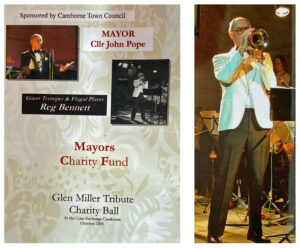
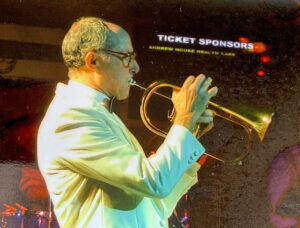
Reg’s 60th Musician’s Night
On the 26th November 2006 it was Reg’s 60th birthday and to celebrate, he organised a Musicians’ Night at the Berkeley Centre in Camborne. It was the night following the Camborne Town Band re-union concert so a busy time for him.
It featured five great bands, all of which Reg had been involved in at some time: Great Western Jazz Company, Cornish All Stars, John Austin Big Band (Sound of Glen Miller), Viv Rodd & Chris Gale and Soul Survivors. It raised £5,500 for Macmillan Nurses and provided the Berkeley Centre with one of their busiest nights ever.
 Reg’s 60th
Reg’s 60th
Reg and Patsy had divorced in 1996 and in 2020 he re-married. Reg and Sue Wilson had actually been together for about 20 years before they decided to tie the knot. As we chatted, we could see Sue pottering in their garden and Reg commented, “We share a love of many things including classical music”.
Retirement Looms
By the time Reg retired, in 2016, his musical career had spanned almost 60 years. I asked him why he had chosen to give up playing at that particular time. His response was immediate, “The musical world had changed considerably and I felt that the time was right to stop. Music has been a huge part of my life and I wouldn’t have missed it for the world. I have been fortunate to have been involved in such a wide range of genres, each one different and very enjoyable but you need to know when to bring it to a close. I still have my many instruments: three trumpets, a long cornet, a pocket cornet, two flugel horns, a slide trombone which I can’t play, a very ancient valve trombone and an American marching euphonium. I still have the occasional blow but now it’s just for me, Sue and the dog. Throughout my career I’ve played with some great musicians, many at the top of their chosen genre, but for me it wasn’t just the playing, it was about giving the audience what it wanted, it was about entertaining, it was about leaving them wanting more.”
This article is just one aspect of Reg’s life. It sat alongside his Day Jobs, firstly as a member of Cornwall’s farming community and then as the Camborne Town Clerk, a role which he undertook in his own pragmatic way. The various aspects of his life will be eventually pieced together to become The Reg Bennett Story.
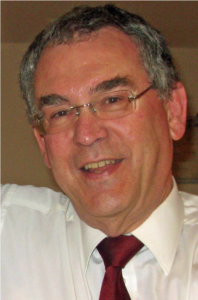
Tony Mansell is the author of several books on aspects of Cornish history. In 2011 he was made a Bardh Kernow (Cornish Bard) for his writing and research, taking the name of Skrifer Istori. He has a wide interest in Cornish history and is a researcher with the Cornish National Music Archive and a sub-editor with Cornish Story: an Institute of Cornish Studies initiative.

Mornin, Tony,
I have known Reg Bennett for a number of years, in fact, we share the same birthdate and I’d love to send him a greeting if you happen to have an email address for him that you can share. He kindly invited me and my Mayoress to his birthday DO at the Berlay Centre, Camborne in 2004.
I see mention of Johnny Austin, he still goes and lives in Breage. Would he be worth you catching up with as he’s getting on a bit now?
By the way, I have made a definite start on the dialect story you kindly reminded me of recently.
A lovely day today, but think we’re experiencing the ‘lul before the storm’…
A rich and informative article – wonderfully done!
Played at a mvt military group do in the keep at Falmouth fort great player in our band what a fab night we had !a top professional played and great chap allround .